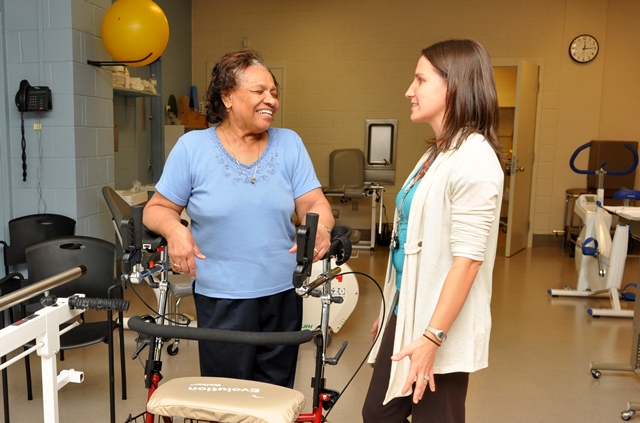Dorothy Masih was visiting Trillium Health Partners for a routine appointment when she suffered a fall walking through the hospital corridors. She was quickly assisted by a hospital volunteer and taken to the emergency department where she was screened by the attending physician who determined that she was at risk for future falls. Her name was then entered into a database as part of Trillium Health Partners’ falls prevention strategy.
Dorothy was treated for cuts and bruises suffered in her fall, and released. A few weeks later, Dorothy received a phone call asking if she would be interested in coming to the hospital to take part in a falls prevention program where she and other participants would learn how to better protect themselves from another painful fall. Dorothy agreed, and says what she gained from that clinic has changed her life.
According to a report from the Ontario Injury Prevention Resource Centre, falls are the second leading cause of injury-related hospitalizations for all ages. Seniors 65 and older are nine times more likely to suffer fall injuries than younger persons. Falls are a huge problem. They can be life altering for many people and in the worst cases can result in death. Falls often result in psychological harm. Victims become frightened of falling again and as a result limit activities, which can lead to other issues, such as isolation and immobility issues. The fact of the matter is that falls are often preventable.
Understanding this reality, Trillium Heath Partners recognized an opportunity to promote health and safety within the community by helping to prevent falls for those who are particularly prone to them. While there had always been a falls prevention strategy in place, there was a chance to really address this problem in a more strategic manner.
The new program is an initiative of the internationally-recognized Best Practice Guideline in falls prevention, which the hospital has committed to achieving as part of its candidacy for the Registered Nurses Association of Ontario’s (RNAO) Best Practice Spotlight Organizations (BPSO) designation.
“Our fall rate was above where we wanted to it to be so we were very driven to reduce it and improve outcomes for patients,” says Chris Zettler, Manager, Professional Practice Portfolio,Trillium Health Partners. “In addition to that, we have a large seniors’ population in our community so it was important for us to create programs that addressed their needs.”
The hospital introduced a post-fall huddle across all sites for in- and out-patients. This tool promotes team discussion and analysis of the event in an effort to prevent it from happening again. The hospital implemented a trial use of low beds to prevent injuries in patients who are prone to repeat falls. A number of visual cues are also now in use, including screening information that appears on status and electronic white boards, as well as “fall precaution” stickers on patients’ armbands, charts alert sheets and other relevant areas.
MORE: ONTARIO HEALTH STUDY A CHANCE TO IMPROVE PUBLIC HEALTH
Trillium Health Partners has also begun screening out-patients at registration to identify whether or not they are at high risk for falls. If patients are at risk staff will make sure they have the proper assistance from volunteer escorts while visiting the hospital and will follow up with them once they are home to see if they are interested in participating in a falls prevention clinic.
While the initiative is nurse-led and driven, Trillium Health Partners broadened the program to include all allied health staff, physicians and volunteers from across the organization; it is a truly interdisciplinary approach.
“It takes a village,” says Zettler. “Our professional service team attains information from our patients in order to assess whether or not they are prone to falls, our volunteers utilize wheelchairs set up by their stations to help patients get from one part of the hospital to another and our porters help get patients and their information from one unit to another.”
Trillium Health Partners’ goal for the inpatient program is to achieve the industry standard of four falls per thousand patient days. For our outpatient program, we really wanted to see a reduction in the number of falls and fall-related injuries while people are visiting our facilities.
Trillium Health Partners has experienced great success with a number of its falls prevention tactics. The trial use of low beds resulted in an 80 per cent reduction of falls and there were no injuries for the patients who used low beds. Furthermore, the implementation of visual cues has played a significant role in raising awareness amongst staff, physicians and volunteers.
MORE: FEEDING DISORDERS CLINIC SETS TABLE FOR SUCCESSFUL EATING
“We are very pleased with our progress to date. The falls prevention strategy has increased the overall awareness of falls and the need to prevent them both within the hospital and outside its walls,” says Zettler. “As a result of this program and the efforts of all those involved, we have seen our inpatient fall rates decrease steadily. The outpatient program is a more recent initiative and we are continuing to monitor the data on a quarterly basis but we are encouraged by the preliminary results for people like Dorothy.”




